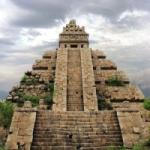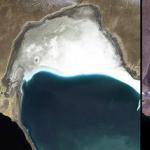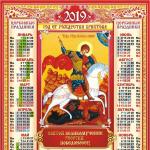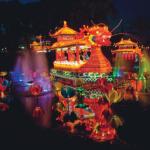Battle of Kruty |
|
Near Krut, Ukraine |
|
The offensive of the RSFSR on the territory of the UPR. |
|
Tactical victory of the RSFSR, defeat of the UPR |
|
Opponents |
|
Commanders |
|
Averky Goncharenko |
Mikhail Muravyov |
Strengths of the parties |
|
UPR Army: |
Red Guard: |
Military losses |
|
127-146 people |
|
Battle of Kruty(Ukrainian Biy under Krutami) - armed clash on January 16 (29), 1918 railway station near the village of Kruty, 130 kilometers northeast of Kyiv. An armed clash occurred between the RSFSR detachment of Mikhail Muravyov and the UNR detachment, sent to meet the attackers to protect the approaches to Kyiv.
Course of events
There is no reliable description of the event that took place on January 29, 1918. The versions of the parties, as well as the participants in the events themselves, are contradictory. According to historian Valery Soldatenko on the morning of January 16 (29th New Style), a detachment of Baltic sailors under the command of Remnev (according to some sources, up to two thousand) (according to information from participant in the events S.A. Moiseev, these were not sailors but Moscow and Tver Red Guard detachments ) unexpectedly came under fire from cadets and students, supported by artillery fire from one (according to other versions, two guns). After some time, part of the defenders retreated, and the advance of the attackers was stopped by the previously dismantled railway tracks. Due to the onset of a strong snowstorm, part of the retreating troops (according to other information, a reconnaissance detachment of the defenders returned to the station without knowing that it had been abandoned) was captured and shot. There is also information about eight wounded defenders sent to Kharkov, where no one was interested in them, and they disappeared from the hospitals where they were taken for treatment. According to military historian Yaroslav Tinchenko, 420 people took part in the battle from the UPR side: 250 officers and cadets of the 1st Ukrainian military school, 118 students and high school students from the 1st hundred of the Student Kuren, about 50 local free Cossacks - officers and volunteers. On January 29, 1918, only a few people died; all the rest, carrying away the bodies of their comrades, retreated to the trains and left for Kyiv. And only one platoon out of a hundred students, consisting of 34 people, was captured due to its own oversight. Six of them were wounded, one turned out to be the son of a driver mobilized by the attackers. Everyone was put on a train and sent to Kharkov (they would later be released from captivity). The 27 remaining at the station were shot.
Losses of the parties
As for the number of deaths on the defending side, in addition to the mythical “three hundred Spartans” of Grushevsky, they were called different numbers. Thus, Doroshenko gives a name list of the dead 11 students, although he says that several of them died earlier, in addition, 27 prisoners were shot - as revenge for the death of 300 Red Army soldiers. In 1958, in Munich and New York, the publishing house “Ways of Youth” published the results of S. Zbarazhsky’s 40-year study “Cool. The 40th anniversary of the great rank was 29 June 1918 - 29 September 1956.” The list names 18 people. who are buried in Kyiv at Askold’s grave. Although the retreating UPR troops brought 27 killed in that battle to Kyiv.
The losses of the attackers have varied estimates, but researchers have not found any documentary sources confirming any of the versions.
Contemporary assessments
Here is the assessment of these events by the political party “Rus” (Ukraine):
|
Positions regarding the celebration of the so-called “Battle near Kruty Station” on January 29. This holiday, like many other “stealing” holidays, does not carry a positive and unifying idea for the population of Ukraine. Emphasis is placed on the sacrificial death of young guys, but nothing is said about the fact that the officers, who were supposed to fight to the death along with the soldiers, cowardly ran away from the battlefield. We mourn the dead, but we remember those who thoughtlessly, for the sake of their political interests, abandoned unprepared young men to the bayonets and bullets of the many times superior Bolshevik forces. The episode with the Krutys is used by Ukrainian national patriots to incite anti-Russian hysteria. Although the battle itself took place between the troops of the RSFSR and the UPR, and the Bolsheviks did not represent the interests of Russia at that time. At that time in the territory Russian Empire was walking Civil War, there were several governments claiming supreme power. The UPR also did not represent the interests of the Ukrainian population, since it was not popularly elected. To talk about the ethnic nature of the conflict in this case is criminal. The battle near Kruty is a local conflict between two political entities and an example of the meanness of the Ukrainian authorities of that time, who turned their tactical military mistake into an anti-Russian myth. |
This is how the former chairman of the General Secretariat of the Central Rada of the UPR Dmitry Doroshenko describes these events:
|
“When Bolshevik echelons moved towards Kyiv from Bakhmach and Chernigov, the government could not send a single military unit to fight back. Then they hastily assembled a detachment of high school students and high school students and threw them - literally to the slaughter - towards the well-armed and numerous forces of the Bolsheviks. The unfortunate youth was taken to the Kruty station and dropped off here at the “position”. While the young men (most of whom had never held a gun in their hands) fearlessly opposed the advancing Bolshevik detachments, their superiors, a group of officers, remained on the train and organized a drinking party in the carriages; The Bolsheviks easily defeated the youth detachment and drove it to the station. Seeing the danger, those on the train hastened to give the signal for departure, not having a minute left to take those fleeing with them... The path to Kyiv was now completely open” (Doroshenko, “War and Revolution in Ukraine”). |
Modern assessment
According to Doctor of Historical Sciences Valery Soldatenko, who assesses the events taking place in Ukraine since 2005.
In Ukraine, January 29 is the Day of Remembrance of the Heroes of Krut. This is the date when Ukrainians honor the memory of Kyiv students who fell victims of an unequal battle against the Bolshevik army near the village of Kruty, Chernihiv region. 2018 marks exactly 100 years since that battle.
Complete information about the battle near Kruty has not been established. Thus, the exact number of participants in the battle on both sides remains unclear. According to various sources, the participants in the tragic event were from 300 to 600 high school students, students and cadets and from 3 to 6 thousand Bolshevik troops.
The event was preceded by the adoption by the Ukrainian Central Rada of the IV Universal (late January 1917), which proclaimed the independence of the Ukrainian People's Republic (UNR). The UPR hoped for federal relations with Russia. But the Bolsheviks who came to power put forward conditions for the UPR, according to which the secession of Ukraine was possible only if it interfered in its internal affairs. The Bolsheviks received a refusal, after which their troops began to attack Ukraine.
A year later, the Bolsheviks took control of the Kharkov, Ekaterinoslav and Poltava provinces and launched an offensive against Kyiv.
On January 29, 1918, on a railway platform near the village of Kruty and the village of Pamyatnoye, the Bolshevik army of Mikhail Muravyov entered into battle with students, schoolchildren and 20 officers. At that time, the Ukrainians had about 16 machine guns and one cannon at their disposal.
According to the Ukrainian Institute of National Memory, the first Ukrainian youth school named after. B. Khmelnitsky. Student volunteers and volunteers from units of the local Free Cossacks from Nizhyn also went there.
After many hours of fighting, the Ukrainians retreated in an orderly manner from the Kruty station to their trains. At this moment, about 30 young people from the reserve were captured and were shot by the Bolsheviks the next day.
Participants in the battle of Kruty. Photo: kruty.org.ua
In total, from 70 to 100 people who fought on the Ukrainian side died in the battle.
The battle provided an opportunity to delay the Bolsheviks near Kiev for several days and time to sign the Brest-Litovsk Peace.
The Day of Remembrance of Heroes of Krut is celebrated at the official level after a presidential decree issued on January 15, 2007.
On January 29 at 12.00 in Kyiv at the Lukyanovsky cemetery there will be a celebration of the memory of Vladimir Naumovich and Vladimir Shulgin, who died in the battle near Kruty, and the laying of flowers at the grave of Ukrainian poets Alexander Oles and Oleg Kandyba (Olzhych).
At the Arsenal plant at 18:30 there will be a reconstruction of the events of the battle, and then a torchlight march from Arsenal Square to Askold’s Grave dedicated to the heroes of Krut.
As Apostrophe reported, .
January is a significant month for Ukrainian nationalists. On January 1 they celebrate Bandera’s birthday, and on the 29th they commemorate the “heroes of Krut”.
They shouted and will continue to shout slogans: “To the heroes of Cool - glory, glory, glory!”, “Bandera will come - he will restore order!”, “Glory to the nation - death to the enemies!”.
Yes, if only frostbitten nationalists glorified the “heroes of Krut”. Viktor Yanukovych once said in his address to Ukrainians: “Today we honor the feat of Ukrainian young men who died defending their state. The courage and self-sacrifice of several hundred military cadets, students, and high school students became a real example for subsequent generations of fighters for independence.”
The question arises: what “glorious” happened on January 16 (29), 1918 at the railway station near the village of Kruty, 130 kilometers northeast of Kyiv? What kind of “heroes” were there?
And there the advancing detachments of the Reds tore the detachment of the UPR (Ukrainian People's Republic), a nationalist state formation, like a rag.
Fighting in in every sense It would be very difficult to name what happened near Krutami. “When Bolshevik echelons moved towards Kyiv from Bakhmach and Chernigov, the government could not send a single military unit to fight back. Then they hastily assembled a detachment of high school students and high school students and threw them - literally to the slaughter - towards the well-armed and numerous forces of the Bolsheviks.
The unfortunate youth was taken to the Kruty station and dropped off here at the “position”. While the young men (most of whom had never held a gun in their hands) fearlessly opposed the advancing Bolshevik detachments, their superiors, a group of officers, remained on the train and organized a drinking party in the carriages; The Bolsheviks easily defeated the youth detachment and drove it to the station. Seeing the danger, those on the train hastened to give the signal to leave, not having a minute left to take those fleeing with them…” recalled the Chairman of the General Secretariat of the Central Rada of the UPR Dmitry Doroshenko.
With inimitable seriousness, many modern figures of Ukraine compare this whole circus of blood... with the battle of three hundred Spartans at Thermopylae. That's it, no more, no less.
The political party “Rus” (Ukraine) stated at one time about this: “This holiday, like many other holidays of the “stealers,” does not carry a positive and unifying idea for the population of Ukraine. Emphasis is placed on the sacrificial death of young guys, but nothing is said about the fact that the officers, who were supposed to fight to the death along with the soldiers, cowardly ran away from the battlefield. We mourn the dead, but we remember those who thoughtlessly, for the sake of their political interests, abandoned unprepared young men to the bayonets and bullets of many times superior Bolshevik forces. The episode with the Krutys is used by Ukrainian national patriots to incite anti-Russian hysteria. Although the battle itself took place between the troops of the RSFSR and the UPR, and the Bolsheviks did not represent the interests of Russia at that time. At that time, there was a civil war on the territory of the Russian Empire, and there were several governments claiming supreme power. The UPR also did not represent the interests of the Ukrainian population, since it was not popularly elected. To talk about the ethnic nature of the conflict in this case is criminal. The battle near Kruty is a local conflict between two political entities and an example of the meanness of the Ukrainian authorities of that time, who turned their tactical military mistake into an anti-Russian myth.”
The event for mythologizing was very poorly chosen. The Ukrainian nationalists could have pushed themselves harder and come up with an anniversary for a less funny battle. Who gets the “glory” here? The officers who got drunk on the train while the Reds beat their inexperienced subordinates, and then abandoned their personnel in the lurch? This is not glory, this is disgrace.
IN military history The “independents” did not always look like such a bunch of armed clowns as they did at Kruty. But those who now glorify the heroes of this shameful “drape” look like even bigger clowns.
This skirmish is described here quite impartially http://fraza.kiev.ua/zametki/21.12.06/32124.html 78.85.213.202 22:10, February 3, 2009 (UTC) bear
Added short description canonical Ukrainian version. To some, terms like “Muscovite-Bolshevik hordes” may seem non-neutral, but modern Ukrainian history operates with precisely such terms. This version may be senile (like the entire 140,000-year-old Ukrainian “history”), but the reader has the right to know it too. For balance, I added criticism of this version.
By the way, “3 Modern Assessment” and “4 Contemporary Assessments” are essentially correct, but both of these sections look strange side by side :) Can you rephrase this? --78.85.128.167 13:40, February 6, 2009 (UTC)bear
You meant the canonical-diaspora version - yes there. Since 2005, the Institute of National Remembrance has been working on the topic “forming a fair centuries-old history for a united Ukrainian nation" - and this is not really history - this is “ideology" --Jo0doe 15:14, February 6, 2009 (UTC) A political scientist is not a historian, journalists are not AI either, you need to find something AI on this issue or delete Jo0doe 15:17, February 6, 2009 (UTC) Vajra is quite well versed in history, he has a lot of articles on the history of Ukraine. The official Ukrainian version is compiled both from articles and from links from the Ukrainian version of the article. Here, for example, is the “Handbook of the History of Ukraine” http://history.franko.lviv.ua/IIk_6.htm Almost a complete set of insanity. There are bayonet attacks, “singing of the anthem”, and German “liberators”. To be honest, I don’t understand what AI can be from the insanity that is now being passed off as history in Ukraine. Every time you come across modern Ukrainian history, you come across a conscious falsification. Here is another link from the Ukrainian version of the article www.kruty.org.ua/2008-10-05-22-43-33/145-2008-11-01-22-31-38.html In general, there is no history in Ukraine now - only ideology. 78.85.128.167 16:17, February 6, 2009 (UTC)bear This is not " official version" - this is the version of franko.lviv.ua - who else would not sing the anthem if not a Galician - in Ukrainian there is no concept of “of-history” - so you need to correct the type to version popular in publications of the North American Ukrainian diaspora(links to Subtelny, Magochi, “their” “History of Ukraine”) since 2005 has become widespread in official .... Jo0doe 16:46, February 6, 2009 (UTC) Edit. “The version of the diaspora, after the Orange Revolution, received the status of official history.” Something like this. 78.85.128.167 16:52, February 6, 2009 (UTC) bear why on earth is the authority of an AI determined by the country of publication? Why are periodicals cited as AI in the description of the course of events? Give at least a few versions, and not great-power chauvinistic propaganda. and these people also criticize their opponents for their non-subjective views. what did it say about the log and the straw? 89.209.10.50 09:38, March 13, 2010 (UTC)
A number of proposals [edit code]
And I have a number of proposals - 1) rename the Skirmish near Kruty (based on the size of the event) 2) give a broader description 3) And when this “army” of Muravyov was “Bolshevik” - it seems he himself was not one Jo0doe 19:56 , February 5, 2009 (UTC)
It’s probably worth going to the library to get a newspaper from that time - where the history will be more interesting - where there was no battle - and the students ended up with anarchist sailors in a snowstorm, that the heroic Petliura, along with an equally heroic detachment of Sichov archers, escaped somewhere as far away as Zhmerinka. And how they then watered the kerovniks - how to divide the money - there is a lot of it - and how to fight - so the students Jo0doe 20:08, February 5, 2009 (UTC)
- Interesting quote
January 5, 1918, that is, the day of the surrender of Poltava, at a meeting of students junior students Kyiv University St. Vladimir and the newly created Ukrainian People's University, convened by initiative of Galician students, It was decided to start creating a student kuren of the Sichovyi Streltsy. “Under the threat of boycott and exclusion from the Ukrainian student family, all Ukrainian students must begin to form.” In addition to students, the kuren included students from two senior classes of the 2nd Ukrainian named after. Cyril and Methodius Brotherhood Gymnasium. In total, about 200 people signed up (the second hundred later took part in the battles in Kyiv, that is, they did not leave the city). The military authorities appointed foreman (centurion) Omelchenko, who by that time was enrolled as a student at the Ukrainian People's University, as commander.
Due to the lack of information about the battle, its events have become overgrown with myths, exaggerated assessments and distortions of facts in the interpretation of various political forces and ideologists.
Does anyone have any objections to some inaccuracies?--Diogen15 10:13, January 30, 2014 (UTC)
- I see no reason for change. Specifically, I am perplexed by attempts to remove the definition of “ Soviet troops" What caused this desire? HOBOPOCC 10:51, January 30, 2014 (UTC)
- Well, personally, I looked at the preamble again and see only one flaw - the last and penultimate sentences are not very nicely coordinated. I see no reason to change anything in the wording, and Diogen15 did not outline these reasons. Can we rephrase it like this:
With the exception of replacing the term "battle" with "battle" it is almost the same as what I initially proposed. Why in paragraphs and so on? I explained. Initially, there was such a formulation: “although the battle had no impact... the events were overgrown with myths,” there is no direct connection between these statements, a general battle can also become myths. + attributing special significance to an event in Ukraine, according to the old definition, seems to directly follow from mythologization and exaggeration, which again has no direct connection: myths due to the lack of accurate information, the significance of the feat due to national solidarity. Thank you for your mediation. --Diogen15 19:31, January 31, 2014 (UTC)
- What is this “Due to a lack of information...”? I'm against. And I don’t see any point in “dividing into paragraphs.” The introduction is not so cumbersome that the unfortunate three sentences that make it up should be divided into paragraphs. I'm against. HOBOPOCC 19:44, January 31, 2014 (UTC)
- Dear intermediary, I ask you to evaluate the personal attacks and other violations of VP:EP (). During those times, you personally created for me for something like this forever the “image of a chronic offender”) HOBOPOCC 10:40, February 1, 2014 (UTC)
- It’s clear that this is at least a day’s rest. And your image is not forever, but for a long time. But then you yourself were to blame... The communist NOVOROSSS was funny, no less than the anti-Ukrainian element Spectrum and the fighter for Orthodox values Helsing. --wanderer 10:56, February 1, 2014 (UTC)
controversial inappropriate statement in the preamble[edit code]
- Statement in the preamble " this battle did not affect the subsequent military campaign", as follows from AI (" One of the current successors who will transfer the meaning of the battle near Kruty to the military ... plan, ...") and the text of the article is debatable.
- Statement " events have become overgrown with myths, exaggerated assessments and distortions of facts" is insignificant for the preamble and inappropriate in it.
Since a statement of the form “Although (controversial statement 1), then (inappropriate statement 2)” is both controversial and inappropriate, I propose to move it from the preamble to the section “Assessments of events at the turn of the 20th-21st centuries”, and reformulate it there in accordance with AI .
- Yuriy Dzyadyk (o c) 06:33, 17 August 2016 (UTC).
- No. Read what the introduction to the article is, please. HOBOPOCC (obs) 07:11, 17 August 2016 (UTC)
- Do you mean these essays? In this case, the rules apply, primarily VP: AI and VP: NPC. - Yuriy Dzyadyk (o c) 10:55, 17 August 2016 (UTC).
- Why do you call certain statements in the article “both controversial and inappropriate”? Is your opinion (of the anonymous Wikipedia editor) shared by any of the recognized experts in the GVR? Give quotes and links to such AIs, please. HOBOPOCC (obs) 11:15, 17 August 2016 (UTC)
- I will repeat Wulfson’s answer (to your question): it’s not interesting, such questions will remain unanswered in the future. A quote from AI is given in the request. In modern historical science the battle of Kruty belongs to the history of Ukraine, and not to the GVR in Russia. There have been hundreds of more significant battles in the history of Russia, but this one is completely inconspicuous compared to others. - Yuriy Dzyadyk (o c) 21:32, 17 August 2016 (UTC).




